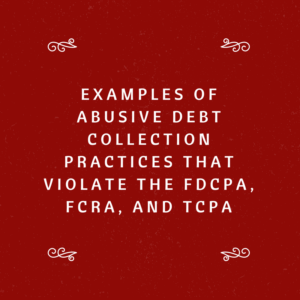Examples of Abusive Debt Collection Practices That Violate The FDCPA, FCRA, and TCPA
Examples of Abusive Debt Collection Practices That Violate The FDCPA, FCRA, and TCPA
Not all debt collectors are willing to break the law but many are willing to break the laws.
We wanted to list a number of examples of the types of abusive debt collection practices we commonly see committed against Alabama consumers.
FDCPA (Fair Debt Collection Practices Act) Violations
- Calling you an excessive number of times in order to harass you
 They’re calling your family members
They’re calling your family members- Creating a “block party” by calling your neighbors.
- Calling your co-workers (“office party”)
- Contacting your human resources or payroll department
- Calling your supervisor
- Continuing to credit report against you after the debt collector loses the collection lawsuit
- Continuing to collect against you after the debt collector loses the collection lawsuit
- Credit reporting a debt after the time limit has expired
- Faxing an “employment verification form” to your work
- Leaving a voicemail without leaving the “Mini-Miranda” warning
- Re-aging your debts on a credit reports to make them stay longer than allowed
- Refusing to mark your account as disputed on credit reporting
- Sending a letter or calling you when the debt collector knows that you are represented by a lawyer
- Sending you a letter without identifying who the creditor is
- Suing you after the statute of limitations has expired
- They try suing you in the wrong county — i.e. not where you live or where you took out the consumer debt
- Suing you when you do not owe the debt
- Suing you with no intention of proving its case
- Threatening to sue you after the statute of limitations has expired
- Threatening to garnish your wages without having a judgment (unless the debt is a federal student loan)
- They threaten to garnish on federal student loans without having a properly obtained administrative wage garnishment order
- Threatening to garnish your bank account without having a judgment against you
- Threatening to credit report after the time limit to credit report negative information has expired
- Using any type of deception in the collection calls or letters
- Using profanity or racial slurs in the collection efforts against you
FCRA (Fair Credit Reporting Act) Violations
- Continuing to credit report against you after the debt collector loses the collection lawsuit (you must first dispute through the credit reporting agencies)
- Verifying false credit reporting information after you have disputed the false information through the credit reporting agencies
- If the collector sues you, loses the lawsuit, and you dispute through the credit reporting agencies and the collector continues to credit report
TCPA (Telephone Consumer Protection Act) Violations
- Using robo dialed (auto dialed/predictive dialed) calls against your cell phone when you never gave permission to the collector or original creditor or you revoked any permission
- Using pre-recorded messages or machine generated voice messages against your cell phone when you never gave permission to the collector or original creditor or you revoked any permission
So What Is The Solution To These Violations?
The ultimate solution to help yourself and help others is to sue the debt collector for violating the law.
If you live in Alabama feel free to give us a call for a free consultation on your rights. It may be that you can sue or it may be you need to take some other action.
Regardless, we will be glad to help you understand your rights and options.
Give us a call us at 205-879-2447.
Or you can fill out our contact form on our website.
We look forward to hearing from you.
Thanks for reading, and have a great day!